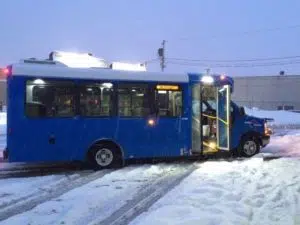
File Photo By Matt Hermiz
Owen Sound has approved a short-term contract extension to the city’s transit service until August, although the status quo will end in June.
Council approved a staff recommendation in a 5-4 vote at its meeting Monday night to green light extending the city’s contract with First Student until August, while switching to an hourly pilot service during the summer months of June, July and August to stay within the city’s proposed $1.13-million conventional transit budget for 2022.
Mayor Ian Boddy, Deputy Mayor Brian O’Leary, and councillors Brock Hamley, Scott Greig and Richard Thomas supported the recommendation. Councillors Travis Dodd, Marion Koepke, Carol Merton and John Tamming voted against it.
“Ridership usually decreases during the summer months because of the nice weather and that students, predominantly at Georgian College are not in classes,” a report by the city’s director of public works and engineering Dennis Kefalas says. “This hourly service level pilot project will also allow staff to gauge the interest and user satisfaction of an hourly service and provide flexibility moving forward to deal with future cost escalations associated with providing a transit service.”
The contract extension will actually see the type of buses used by First Student to provide the city’s conventional transit change. Instead of the traditional style, school buses wrapped to look like the current buses would be used to allow First Student to transition the vehicles into their school bus fleet after the contract period ends.
The buses currently being used have reached the end of their useful life and First Student is doing everything they can to keep the buses on the road,” Kefalas says. “The city has reached out to various suppliers with the help of our consultant to see what options are available to provide buses to First Student to allow them to continue to provide service until August 2022.”
Kefalas’ report says this one of two options presented by First Student for the contract extension. The other would have been buses leased from another entity more in the traditional style, but the costs would have been about 16 per cent higher for the city.
City council heard during budget talks the cost of transit service delivery is increasing by 49 per cent in 2022 — about an additional $500,000 — while ridership has been in steady decline for most of the past decade.
The city recently put out a request for proposals from service providers to operate and maintain the Owen Sound Transit Service. Bids will close next month. A report is expected to come back to council at its March 28 or April 11 meeting.
The RFP includes a request for application to submit proposals for two different service options. One would be similar to the traditional service, fixed routes with mobility bus service.
The second option would be to run an on-demand transit and mobility bus service with the existing route service area in Owen Sound.
Kefalas anticipates the rate in a new contract will exceed $100 an hour, resulting in a deficit of about $120,000 for the transit service.
“Should the rates submitted as part of the RFP process exceed $100 per hour the pilot project could be extended to the end of 2022 allowing staff to remain within the proposed budget and time to prepare options for council to consider moving forward into 2023,” Kefalas says in his report.
According to Kefalas’ report, the city and First Student first entered into an agreement for the operation of the Owen Sound transit system in August 2014. The city’s base system includes four routes that operate on 30-minute cycles, Monday to Saturday.
The hourly rate the city pays for transit service has increased by about 51 per cent since 2015 — from $63.38 per hour to $95.28 as proposed in the contract extension period to August.
Coun. John Tamming voted against the recommendation and indicated he would not support any extension of conventional transit. In December, Tamming tried to bring forward a motion to end the city’s conventional service entirely but continue mobility transit. It did not find any support. He says he can’t responsibly vote for a system that’s been “grossly underutilized”.
“I don’t say this lightly, but I’ve been staring at this system and I’ve just concluded it can’t work anymore,” Tamming says.
Coun. Brock Hamley recalled his time on the accessibility advisory committee and says a number of folks who served on it are users of the city’s transit service.
“There is wide acceptance, I think, among riders that the system has to change,” Hamley says.
Coun. Carol Merton told her colleagues they are “all privileged” to have independent means to transport themselves. She says whether something is underutilized does not mean there isn’t a purpose.
“And there isn’t a group of individuals who absolutely, essentially require transit,” Merton says. “I do agree there are significant discussions that need to happen when the RFP comes in.”
Council also passed a subsequent motion introduced by Coun. Dodd to ask the police services board to consider reviewing the taxi by-law and driver for hire rates, including a variable to fixed rate change. Dodd says council needs to proactively think about what some of the ramifications might be as a result of an alteration of the current transit system.



